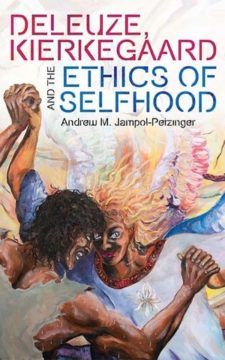Henry Somers-Hall at Notre Dame Philosophical Reviews:
 While there are references to Kierkegaard scattered through Gilles Louis René Deleuze’s work, these references have largely been overshadowed by the more pronounced (and less overtly ambivalent) influence of Nietzsche on Deleuze’s thought. For both, opposition to Hegel is a central theme in their thought, which for both leads to an attempt as Deleuze writes, ‘to escape the element of reflection’ (Deleuze 1994: 8). Similarly, both emphasise the importance of philosophical style, and move to indirect communication as a way of avoiding what they see as a tendency to conflate the representation of movement or becoming with becoming itself in traditional philosophical discourse. Nonetheless, there is an obvious difference between Deleuze and Kierkegaard, with Deleuze being a thoroughgoing atheist, and Kierkegaard a major theological thinker. In this book, Andrew Jampol-Petzinger focuses on the normative dimensions of both philosophers’ work, arguing that such a reading can diffuse some of the tensions between the theological positions of the two philosophers, as well as providing a corrective to some of the readings of Deleuze’s thought that emphasise the self-destructive aspect of the Deleuzian ethical project. Jampol-Petzinger addresses this through a focus on the account of the self that both philosophers develop, one that rejects a unified model of the self in favour of an account that draws out the consequences of Kant’s fracturing of the self in his paralogisms.
While there are references to Kierkegaard scattered through Gilles Louis René Deleuze’s work, these references have largely been overshadowed by the more pronounced (and less overtly ambivalent) influence of Nietzsche on Deleuze’s thought. For both, opposition to Hegel is a central theme in their thought, which for both leads to an attempt as Deleuze writes, ‘to escape the element of reflection’ (Deleuze 1994: 8). Similarly, both emphasise the importance of philosophical style, and move to indirect communication as a way of avoiding what they see as a tendency to conflate the representation of movement or becoming with becoming itself in traditional philosophical discourse. Nonetheless, there is an obvious difference between Deleuze and Kierkegaard, with Deleuze being a thoroughgoing atheist, and Kierkegaard a major theological thinker. In this book, Andrew Jampol-Petzinger focuses on the normative dimensions of both philosophers’ work, arguing that such a reading can diffuse some of the tensions between the theological positions of the two philosophers, as well as providing a corrective to some of the readings of Deleuze’s thought that emphasise the self-destructive aspect of the Deleuzian ethical project. Jampol-Petzinger addresses this through a focus on the account of the self that both philosophers develop, one that rejects a unified model of the self in favour of an account that draws out the consequences of Kant’s fracturing of the self in his paralogisms.
more here.
